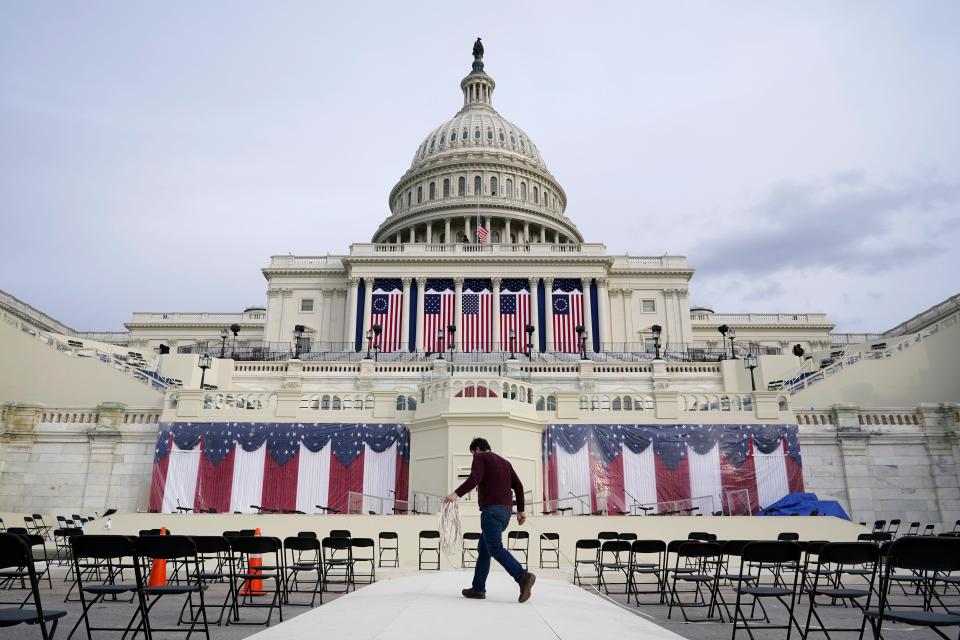Why there's hope Joe Biden's quest to unify America will work
American democracy is seemingly stretched to the breaking point. Even setting aside the rancor in Washington, D.C., ordinary voters do not just disagree on the issues, they deeply dislike and distrust those from the opposing political party.
According to data from the Pew Research Center, more than 40% of Americans think the other side’s policies are a threat to the nation. Members of both parties describe the other side using words like closed-minded, unpatriotic and immoral. They see the other side not just as their political opponents, but as bad people.
This animosity poisons our politics. It hollows out trust in government, undermines support for core democratic principles, and in some extreme cases, is even used to justify violence against the other side, as we tragically saw earlier this month.
President Joe Biden, shortly after he won the November election, noted that he wanted to end “the grim era of demonization in America” and unify the country. And Wednesday in his Inaugural Address, the new president said: "History, faith, and reason show the way, the way of unity. We can see each other, not as adversaries, but as neighbors. We can treat each other with dignity and respect. We can join forces, stop the shouting and lower the temperature, for without unity there is no peace, only bitterness and fury. No progress, only exhausting outrage. No nation, only a state of chaos."
Is unity still possible in America?
We spent 2019 trying to find out, by bringing together more than 500 Democrats and Republicans for cross-party discussions. Our results, soon to be published by Cambridge University Press, offer a glimmer of hope.
We found that a 15-minute, in-person conversation with members of the other party dramatically reduced partisan hostility relative to those who only talked to others from their own party. Further, we re-interviewed participants one week later and found that these effects endured, so these are not just fleeting changes in behavior, but point to something longer-lasting.

From these hundreds of conversations, we have drawn a few lessons relevant to our current politics. First, although it might not seem that way, there is still much that unites Democrats and Republicans alike. Yes, there is disagreement in American politics, especially on salient issues. But there are many areas where majorities of both parties can agree, from infrastructure, to paid parental leave, to campaign finance reform and many more.
More common ground than it appears
One of the most heart-warming aspects of conducting our study was the number of times participants came up to us afterward and told us how enjoyable it was. They expected to shout at the other side, but instead were able to find common ground and bridge the partisan divide.
This anecdote shocks many listeners — even other academics — because they assume that there is no common ground between the two sides. Such misperceptions stem from the tendency of the mass media — and especially social media — to amplify the loudest and most extreme voices in the room.
As a result, most people incorrectly think the fringes of each party are the norm. In a recent study, researchers found that Americans overestimate the extremity of those from the other party by a factor of two. But when Americans actually interact with an average member of the other party — and not a Facebook comment section come to life — they often find more in common than they’d expected.
Our research underscores the importance of genuinely listening to one another. So often in our lives, we only partially hear what others are truly saying. But in the study, participants had the opportunity to listen carefully to one another.
Someone else’s reality is typically more complex, and more nuanced, than we assume, and we gain insight and understanding when we genuinely hear them.
As other research has shown, this type of listening — and the meaningful conversation it inspires — helps us empathize with others, shed partisan stereotypes and change attitudes.
Of course, not everyone is willing to have this sort of conversation, and some will remain steadfast in their conviction that the other side is irredeemable. But this is a smaller share of the population than many think: in some of our other research, we find that more than 80% of Americans know someone from the other party that they like and respect.
Civic organizations can help
Likewise, a growing number of civic groups have emerged in recent years to sponsor similar dialogues, testifying to their popularity. Talking neighbor to neighbor and friend to friend can be a way to work together to rebuild our civic infrastructure.
One might wonder if the 2020 election and its aftermath have so shattered our politics that this sort of dialogue is simply quixotic. It is a fair question, one that we have asked ourselves many times in recent weeks.
But Americans must either work together to perfect our union, and truly fulfill our promise of liberty and justice for all regardless of race, creed and class, or we will simply cease to be a functioning democracy. Citizens from both parties can surely rally around that call.
Matthew Levendusky is professor of political science, as well as Stephen & Mary Baran Chair in the Institutions of Democracy at the Annenberg Public Policy Center, at the University of Pennsylvania. Dominik Stecula is assistant professor of political science at Colorado State University.
You can read diverse opinions from our Board of Contributors and other writers on the Opinion front page, on Twitter @usatodayopinion and in our daily Opinion newsletter. To respond to a column, submit a comment to letters@usatoday.com.
This article originally appeared on USA TODAY: Why Joe Biden's mission to unify America can succeed

 Yahoo Movies
Yahoo Movies 
